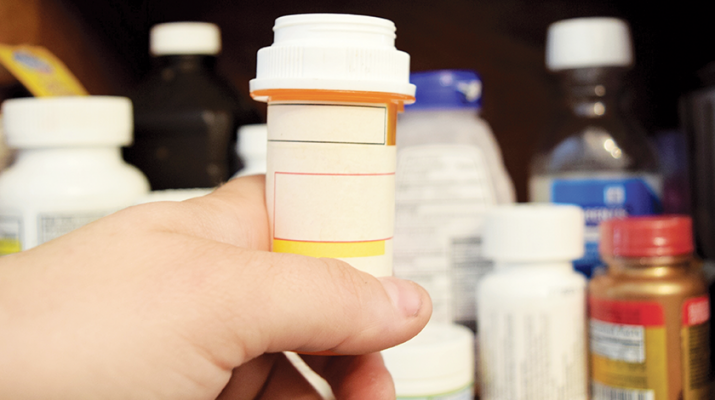Manage, safeguard your medications properly
By Barbara Pierce

How many of us know exactly what’s in our bathroom medicine cabinets? For most us, a quick look inside our medicine cabinet may offer more than a few surprises.
The odds are that we’ll find some old prescription bottles way beyond their expiration date or that we’re no longer taking, maybe some old vitamins and questionable supplements.
“It’s a good idea to go through your medicine cabinet every three to six months,” advised Scott Burns, pharmacist and director, Rome Memorial Hospital Retail Pharmacy, Rome. “Look for medication you’re no longer taking or expired medication.”
It’s the same process as going through your refrigerator and taking out expired food. Expired pills, like expired food, are not recommended for use, said Burns. “We don’t keep mayonnaise and milk after their expiration date; we shouldn’t keep any expired product in our refrigerator, pantry, or medicine cabinet. An expired product is an expired product.”
There is little evidence that outdated medications become toxic or harmful. However, medication does lose its effectiveness once it’s expired, Burns explained. “All the expiration date means is that it will not be 100 percent effective; the degree to which it loses its effectiveness varies by the medication. The pharmaceutical company determines this by testing. Some say it’s 80 percent effective after a year; others say 50 percent. It depends on the medication.”
It’s especially important not to take this chance with medications that are critical to your health — like nitroglycerin, which should be replaced every six months. You absolutely do not want to take the risk of needing a nitroglycerin pill to treat sudden heart pain, and have the pill not work. And the epinephrine in EpiPens also loses its potency past its expiration date. You don’t want to take a chance that your EpiPen no longer is effective to stop a severe allergic reaction. Medication and supplements that you may have as a just-in-case, or have some left from a previous ailment, like pinworm allicin oil dietary supplement, can remain in your cabinet as long as you are aware of their expiration dates.
Blood pressure pills or blood sugar-lowering agents are medications that all protect you from life-threatening complications.
Expiration dates shouldn’t matter for a medicine that you are supposed to take regularly for a chronic problem, such as to keep your blood pressure normal. If you are taking the medicine as prescribed, it should never have an expiration date that has passed. Expiration dates should be an issue only when you have a medicine for a recurring temporary problem.
Toss out medications that you are no longer taking. You could accidentally take the wrong pill or someone else could. “We think our medications are safe and secure, but they can fall into the wrong hands,” suggested Burns. “Grandkids get them; they think they know what they’re doing. They bring them to school with bad consequences.”
Unused prescription drugs were the most common source of misuse and diversion in teens, according to the federally sponsored National Survey on Drug Use and Health.
“To discard expired medications and those you are no longer taking, there are several options,” Burns said. “The Rome Police Department has a prescription drop box in the lobby, and soon we’ll have a drop-off here at our pharmacy. That is safest and easiest.”
“Don’t flush it down the toilet or put in the water; it will get in the waste and that’s not good for the environment,” he added.
It is important to keep an accurate written list of your medication, Burns advised. This could be critical in case you cannot communicate this information. The list should include the name of the medication, the dose you take, and the frequency. “Every time you see a doctor, update your current list, and put the date on the list,” he advised.
“As people get older, they’re often seeing multiple physicians: a cardiologist, primary physician, dermatologist; all are prescribing medications. One of our biggest challenges is when a patient is admitted through the emergency room. They aren’t at their best and may not be able to tell us what medication they’re taking. ‘A little pink pill’ or ‘a big white pill’ doesn’t help us. We could provide so much better care if we had accurate information about their medication,” he said.

